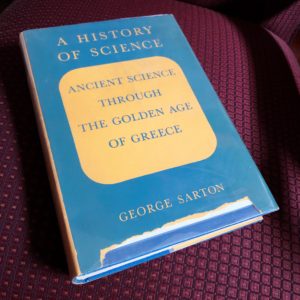 Recently I’ve been finding my attention more and more strongly drawn to the history of science. And like many sequential thinkers, each book I read about a particular topic in the past makes me curious to go farther back to learn what came before it. Thus I have recently taken up George Sarton’s A History of Science; Ancient Science Through the Golden Age of Greece.
Recently I’ve been finding my attention more and more strongly drawn to the history of science. And like many sequential thinkers, each book I read about a particular topic in the past makes me curious to go farther back to learn what came before it. Thus I have recently taken up George Sarton’s A History of Science; Ancient Science Through the Golden Age of Greece.
Prof. Sarton’s writing style is truly delightful – lyrical, engaging, deeply erudite while at the same time remaining very inviting. I only wish I had been able to attend his lectures – they must have been truly remarkable.
Thus far in my reading, he has covered the deep past; the human developments that many may not readily call to mind when the topic of science is discussed, but without which all aspects of human science and technology today would not be possible had not some anonymous early human (or humans, should these things have been discovered or created independently in different part of the globe) made the intellectual leap that made them possible.
Things such as counting or the knapping of flints for blades. Indeed, consider the astonishing leap in early human technology when the first human affixed a stone to a stick for use as a hammer, or a weapon. Such a development, upon contemplation, seems to dwarf the most modern technological advancement when the span of how much that single act changed the world of the humans contemporaneous with it.
Such thoughts are indeed most pleasing to contemplate late into the evening, and deep into the night.
